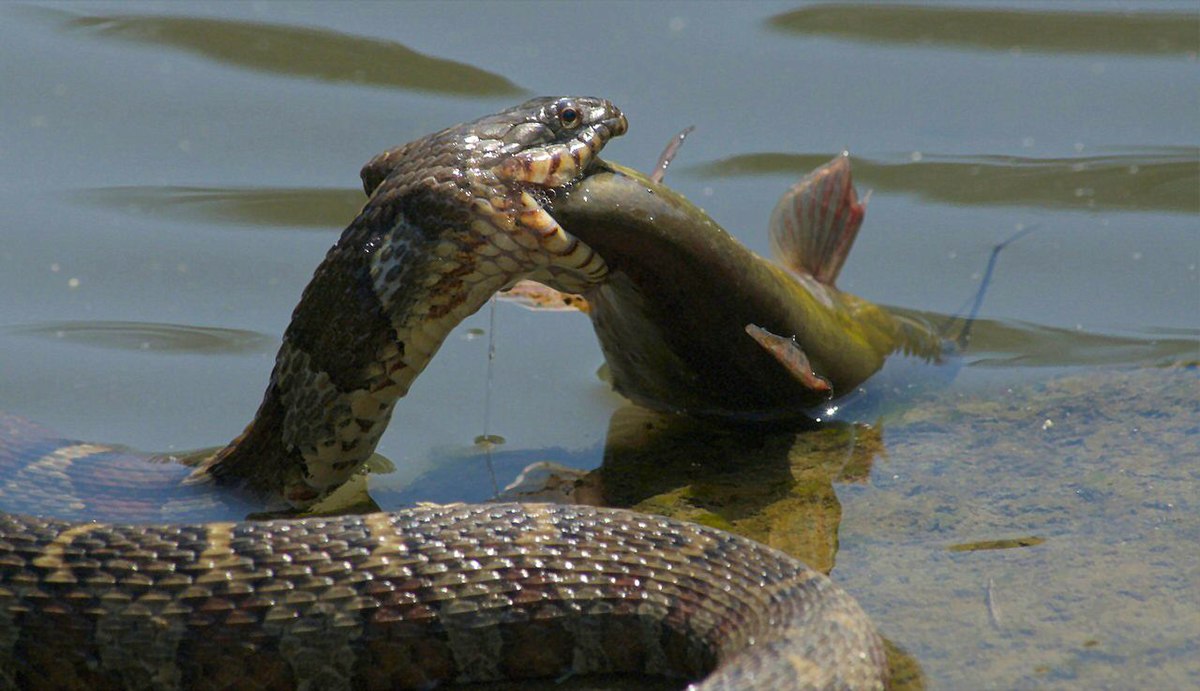Many animals eat fish, including:
– Bears: Some bear species, such as grizzly bears, will catch fish in rivers during their migration to spawn and eat them.
– Birds of prey: Several species of birds of prey, such as eagles, ospreys, and hawks, feed on fish. They have sharp talons to catch fish from the water’s surface.
– Dolphins: Dolphins are marine mammals that feed on a variety of fish, squid, and crustaceans.
– Orcas (killer whales): Orcas are apex predators and consume fish, seals, sea lions, and even other marine mammals.
– Sharks: Sharks have a diverse diet that includes fish species.
– Seals and sea lions: These marine mammals mainly feed on fish and can be seen hunting for fish in the water.
– Otters: Some otter species, such as the sea otter, consume fish as a major part of their diet. They are skilled swimmers and use their paws to catch fish.
– Penguins: Several penguin species feed on fish, which they catch underwater while swimming.
– Crocodiles: Crocodiles are opportunistic predators and will eat fish if they come across them in the water.
– Herons and egrets: These wading birds feed on fish by waiting patiently and swiftly striking with their long and sharp beaks.
– River otters: River otters mainly eat fish and use their powerful tails to swim and catch their prey.
– Snakes: Some snake species, such as water snakes, are adept at catching fish in rivers and ponds.
– Cats: Domestic cats are known to enjoy eating fish, and some wild cats, like fishing cats, are specialized fish hunters.
– Some rodents and amphibians may also eat fish, depending on their habitat and surroundings.
Know More About: what animals eat fish
Animals That Have a Taste for Fish
Introduction:
The underwater world amazes us with its vast array of creatures, each with its unique set of adaptations to thrive in their aquatic environment. Among these creatures, some are known for their appetite for fish, making them formidable predators. Today, we will explore some of these incredible animals that have developed a taste for fish. From apex predators to smaller critters, the animal kingdom boasts a wide range of species that rely on fish as a significant part of their diet, ensuring their survival and shaping ecosystems along the way.
Sharks:
When discussing fish-eating predators, sharks undoubtedly claim the spotlight. With their menacing teeth and streamlined bodies, these apex predators rule the oceans. Their fondness for fish is well-known, making them powerful hunters in the deep. Sharks have developed an arsenal of adaptations to facilitate their piscivorous lifestyles, such as sharp, serrated teeth for gripping and tearing prey, a keen sense of smell to detect even the most elusive fish, and an incredibly fast swimming speed to chase down their quarry.
Killer Whales:
Killer whales, or orcas, are another apex predator that has a particular affinity for fish. These highly intelligent and social animals can be found in all of the world’s oceans, occupying the top spot in the food chain. While they have a varied diet that includes seals, squid, and even other cetaceans, fish plays an essential role in their survival. Cultures within orca populations even specialize in hunting specific species of fish, demonstrating their adaptability and resourcefulness.
Bears:
While bears are more commonly associated with foraging for berries or catching salmon during epic river runs, they are no strangers to a seafood diet. In coastal regions, bears have been known to capitalize on the abundance of fish in the area. Coastal brown bears, for example, will patiently wait near riverbanks or waterfalls during the salmon spawning season, allowing them to scoop up sizable quantities of fish with ease. This ensures they have a reliable food source to sustain them through the year.
Bald Eagles:
When discussing animals that eat fish, we cannot overlook the bald eagle. Known as the national bird and emblem of the United States, these majestic creatures possess incredible hunting skills. Their sharp talons and impressive wingspan make them proficient fishermen, swooping down from the skies to snatch fish from the water’s surface. Bald eagles often seize the opportunity to feed on carrion, including fish washed ashore or those left behind by larger predators. These scavenging tendencies help maximize their chances of obtaining nourishment in both marine and terrestrial ecosystems.
Crocodiles:
While primarily known for their fierce reputation and their ability to snatch prey during dramatic bursts of speed, crocodiles are equally opportunistic when it comes to their diet. Though they don’t solely rely on fish, they are known to prey on fish during their frequent aquatic expeditions. With lightning-fast reflexes and powerful jaws, these semi-aquatic reptiles are highly efficient hunters, maintaining their status as top predators in their respective habitats.
Conclusion:
Animals that have developed a taste for fish have thrived throughout evolution, adapting to their environments and ensuring their survival. From the enormous sharks and killer whales ruling the oceans’ depths to bears and eagles taking advantage of fish-rich habitats, these creatures play a crucial role in shaping ecosystems. Their predilection for fish demonstrates the intricate interconnectedness of nature, where one animal’s dietary preferences can have a cascading impact on the entire food web. Observing the wonders of these extraordinary creatures reminds us of the diversity and remarkable beauty of the animal kingdom.
FAQs on what animals eat fish
1. What animals eat fish?
Many animals eat fish, including bears, birds (such as eagles and herons), seals, sea lions, dolphins, whales, otters, snakes, and some species of turtles.
2. Do all animals that eat fish live in water?
No, not all animals that eat fish live in water. While aquatic mammals like seals and dolphins rely on fish as their primary source of food, land-dwelling predators like bears and some birds also include fish in their diet.
3. What is the largest animal that eats fish?
The largest animal that predominantly eats fish is the killer whale or orca. They are known to prey on several fish species, including salmon and herring, as well as other marine mammals.
4. Are there any insects that eat fish?
Yes, there are certain species of insects, like the water scorpion and the giant water bug, which prey on small fish. These insects are commonly found in freshwater habitats.
5. Do all fish-eating animals consume the entire fish?
No, some animals prefer specific parts of the fish. For instance, many birds eat only the fish’s flesh, disregarding the bones and other non-nutritious parts. In contrast, animals like seals and sea lions tend to consume the whole fish, including bones and organs.
6. Are fish the primary diet of all carnivorous animals?
No, while fish are an important part of the diet for various carnivorous animals, not all of them primarily rely on fish as their food source. These animals may have a diverse diet that includes other prey items like small mammals, birds, or reptiles.
7. Do fish eat other fish?
Yes, fish are known to exhibit cannibalistic behavior. Some species of fish, like the piranha or barracuda, are infamous for their predatory nature and may consume other fish within their habitat.
8. Can herbivorous animals eat fish too?
Yes, although it is less common, some herbivorous animals have been observed consuming fish occasionally. For example, certain species of turtles, like the green sea turtle, have been known to eat jellyfish, which are part of their diet but can occasionally contain small fish.
9. Are there any domestic animals that eat fish?
Yes, some domestic animals, such as cats, are known to consume fish. Many cat food products are even made with fish as one of the main ingredients due to its high protein content.
10. Why do animals eat fish?
Animals eat fish because they are a rich source of protein, fats, and other essential nutrients. Fish is readily available in aquatic ecosystems, making it an important and easily accessible food source for a diverse range of animals.

